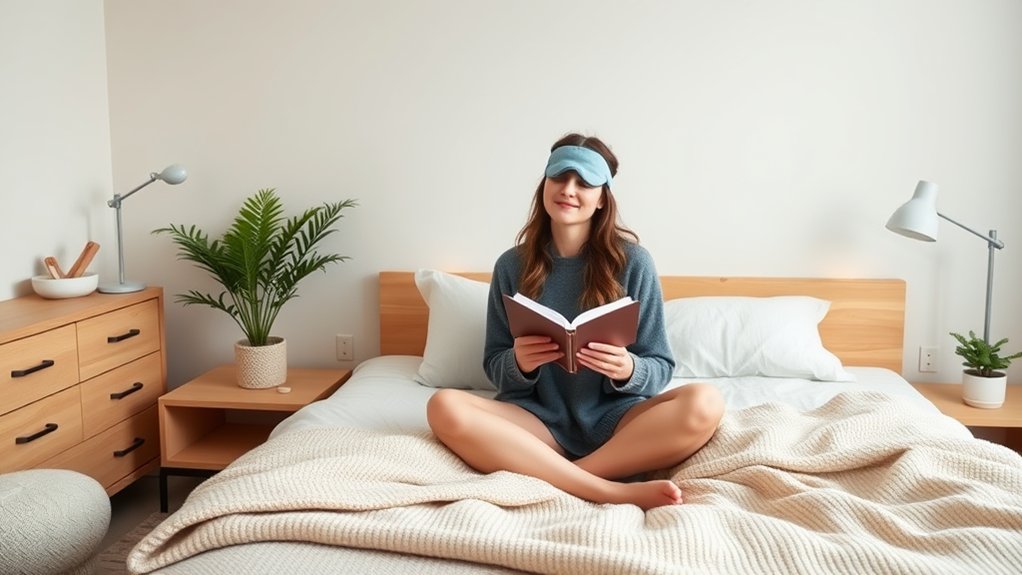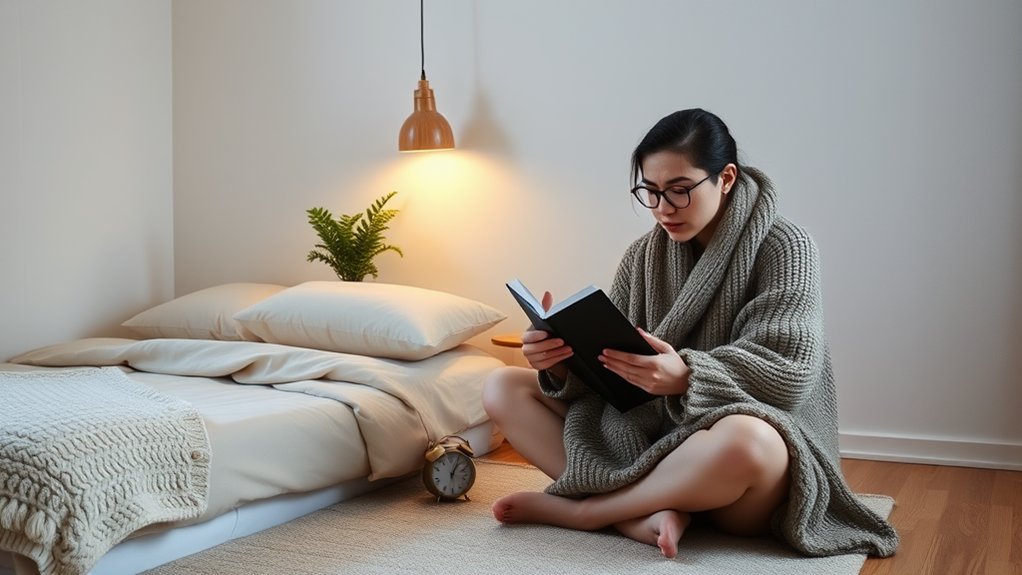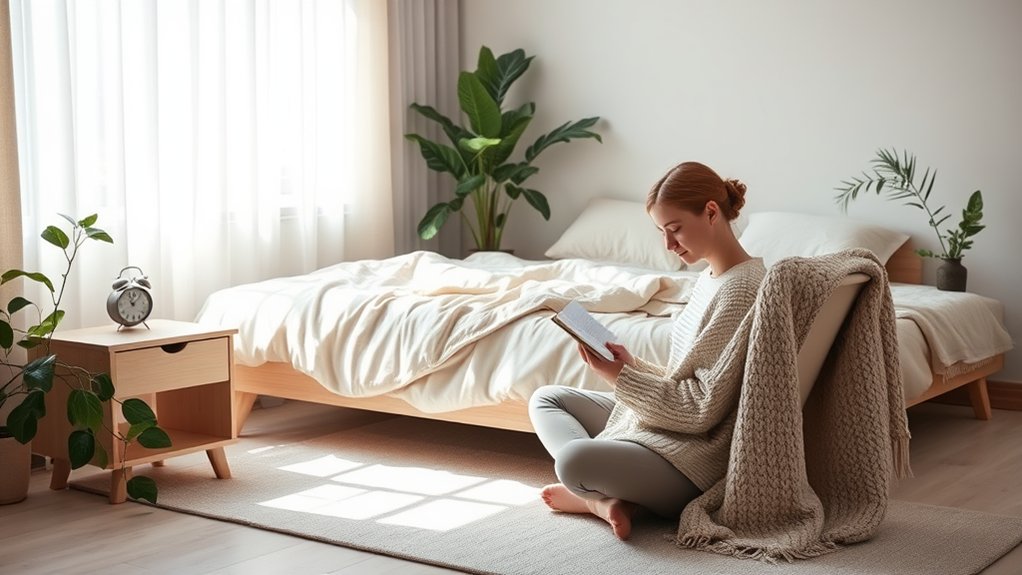Beyond the 3AM Spiral: Meeting Nighttime Fear With Compassion

Nighttime fear is that delightful feeling where your cozy bed morphs into a prison of panic at 3 AM. You know the drill—you hear a creak, and suddenly your brain’s convinced it’s a serial killer lurking in the shadows. Chill out! Try deep breathing or imagining a fluffy unicorn in a field of rainbows. Create a calming space, and remember: you’ve got every right to feel scared. If you stick around, you’ll find more tricks to kick nighttime anxiety’s ass!
Understanding the Nature of Nighttime Fear
When you’re lying in bed at 2 a.m., staring at the ceiling like it’s going to suddenly spill its secrets, you might wonder why the hell your brain decides to turn into a horror movie director at night.
Seriously, it’s like your mind’s got a twisted sense of humor. You know, every creak and groan in your house suddenly morphs into the sound of an axe-wielding maniac. And don’t even get me started on the shadows; they’ve got a talent for looking like they’re plotting your demise.
Your mind turns into a horror show, where every creak is a killer and shadows plot your doom.
But here’s the kicker: nighttime fear isn’t just about being scared of the dark. It’s about vulnerability, too. You’re stripped bare of distractions, left alone with your thoughts.
It’s a breeding ground for anxiety and overthinking, where the mundane turns monstrous. So, embrace it. Laugh at the absurdity of it all. After all, you’re not alone in this late-night panic party.
The Science Behind Anxiety in the Dark
Anxiety in the dark is like that annoying friend who always shows up uninvited and just won’t shut up. Your mind starts racing, conjuring up shadows that dance on the walls like they own the place. Why does this happen? Well, your brain’s wired to be on high alert when the lights go out. The amygdala, that fun little almond-shaped brain region, kicks into overdrive, making you feel like you’re in a horror movie. Check this out:
| Trigger | Reaction |
|---|---|
| Low light levels | Heightened fear response |
| Limited visibility | Increased anxiety |
| Nocturnal noises | Hyper-vigilance |
| Isolation | Feelings of vulnerability |
| Imagination running wild | Catastrophic thinking |
These factors create a perfect storm of anxiety. So, the next time you feel that creeping dread, remember, it’s just your brain being a jerk.
Cultivating Self-Compassion During Nighttime Struggles
You know that moment when the lights go out, and your brain throws a full-on rave party with all the worst-case scenarios? Yeah, we’ve all been there, lying in bed like a burrito of anxiety.
Instead of adding to your own misery, how about you try some self-compassion? Seriously, it’s like giving your overworked brain a cozy hug. Imagine this: you’re not just a bundle of anxiety; you’re also a badass human who’s surviving the chaos.
Next time those nighttime worries kick in, remind yourself it’s okay to feel scared. You’re not alone in this crazy midnight rollercoaster. Talk to yourself like you’d talk to a friend—no harsh judgments, just straight-up support.
Maybe even throw in a little humor: “Oh great, I’m now the CEO of nighttime catastrophizing!” Embrace those feelings, laugh a little, and let that warm self-love light your way through the darkness.
Mindfulness Techniques for Managing Nighttime Anxiety
As the clock ticks closer to midnight, it’s like your brain decides to throw a rave with all the worst thoughts it can muster, right? Instead of spiraling into that anxiety pit, try some mindfulness techniques. They don’t require a degree in Zen or a magic wand, just a willingness to be present.
Check out this handy table for quick mindfulness hacks:
| Technique | What to Do | Why It Helps |
|---|---|---|
| Deep Breathing | Inhale for 4, hold for 4, exhale for 4 | Calms your nervous system |
| Body Scan | Focus on each body part, one at a time | Releases tension |
| Visualization | Picture a safe, happy place | Distracts from anxious thoughts |
| Gratitude Journal | Write three things you’re grateful for | Shifts focus to positive thoughts |
| Affirmations | Repeat a calming phrase | Reinforces positive beliefs |
Give these a shot, and who knows? You might just crash that nighttime party!
Creating a Safe Sleep Environment
Nighttime can be a real jerk, especially when it comes to sleep. You know that feeling when your bed transforms into a wrestling ring, and your pillow’s suddenly a brick? Let’s fix that.
First, kick clutter to the curb. A tidy space can make you feel like you’re in a cozy cocoon instead of a chaotic mess.
Next, dim those lights! A dark room tells your brain it’s time to chill.
And hey, consider some white noise. You know, that soothing sound that drowns out the world? It’s like a hug for your ears.
Don’t forget comfy bedding! Seriously, treat yourself to that soft, fluffy blanket that makes you feel like you’re snuggled up in a cloud.
Finally, make sure your room’s cool, but not freezing—just enough to keep you comfy without turning you into a popsicle. A safe sleep environment could be your secret weapon against nighttime fear.
The Role of Breathwork in Alleviating Fear
Breathwork might sound like some mystical mumbo jumbo, but trust me, it’s got serious chops when it comes to tackling fear.
Imagine this: you’re lying in bed, heart racing like you just chugged three espressos, and your mind’s playing a horror movie on repeat. Instead of spiraling, you can grab that fear by the horns with some deep breaths.
Inhale through your nose, hold it like you’re trying to impress your yoga teacher, and exhale like you’re blowing out birthday candles. It’s not just fancy breathing; it’s science, folks! Slowing your breath sends signals to your brain that you’re safe.
You might even surprise yourself by feeling a little less like a deer in headlights. Seriously, you can turn panic into calm with just a few minutes of breathwork.
Journaling as a Tool for Nighttime Reflection
When your heart’s racing and your mind’s staging its own horror film, the last thing you want is to spiral into a panic.
But hey, instead of letting that anxiety run wild, why not grab a notebook? Journaling can be your unexpected superhero during those sleepless nights.
Here’s how to make it work for you:
- Dump your thoughts: Just write, don’t overthink. Let it all out—no filter, no judgments.
- Identify recurring fears: Notice what keeps popping up? Write those down and confront them. You might realize they’re less terrifying on paper.
- End with gratitude: Before you close that notebook, jot down a few things you’re thankful for. It’s like a warm, fuzzy hug for your stressed-out brain.
Establishing a Calming Nighttime Routine
Creating a calming nighttime routine might just be the best thing you do for your sanity, especially after a day filled with chaos and noise.
Crafting a soothing nighttime routine can be a game changer for your sanity amidst the daily chaos.
Imagine this: you plop down on your couch, Netflix blaring, and your brain’s still buzzing like a damn hornet’s nest. Instead, try dimming the lights, sipping herbal tea, and letting your mind chill out.
Start with a cozy ritual—maybe some light stretching or a few deep breaths. You know, the stuff that makes you feel like you’re in a spa instead of your cluttered living room.
Toss in some soft music or a good book; your brain will thank you later.
Last but not least, ditch the screens at least an hour before bed. Yeah, I know it’s hard, but your future self will appreciate the effort.
Embrace this routine, and soon enough, you might just find that sleep doesn’t feel like an elusive unicorn anymore.
Seeking Professional Support When Needed
You might think you can tackle nighttime fears all on your own, but let’s be real—sometimes you need a little help from the pros.
It’s not a sign of weakness; it’s just smart. If you’re lying awake, heart racing, it might be time to reach out. Here’s how to figure it out:
1. Talk to a Therapist: They’ve got the tools to help you navigate your fears without judgment.
Plus, they’re way cheaper than a lifetime of therapy sessions with your best friend over coffee!
2. Join a Support Group: You’re not alone in this.
Connecting with others who get it can be comforting. Misery loves company, right?
3. Consult a Doctor: Sometimes, your fears might be tied to something physical.
Get your health checked out; you don’t want to miss the forest for the trees!
Final Thoughts
So, the next time you find yourself spiraling at 3 AM, remember that about 40% of us lose sleep to anxiety—yep, you’re not alone in this mad house! Embrace the fear with a hefty dose of self-compassion. Try some breathwork or scribble down those wild thoughts. It might just save your sanity and help you catch some Z’s. And hey, if all else fails, there’s always a late-night meme scroll—because who doesn’t love a good laugh in the dark?
If you’re seeking a deeper way to nurture your emotional safety and find rest, consider exploring the Sleep Return program. With its trauma-informed, nervous-system-based approach, it offers a gentle path to healing nighttime anxiety and restoring your sleep. It’s a heartfelt invitation to embark on a journey towards more peaceful nights and brighter mornings. After all, we all deserve a safe space to unwind and heal.






